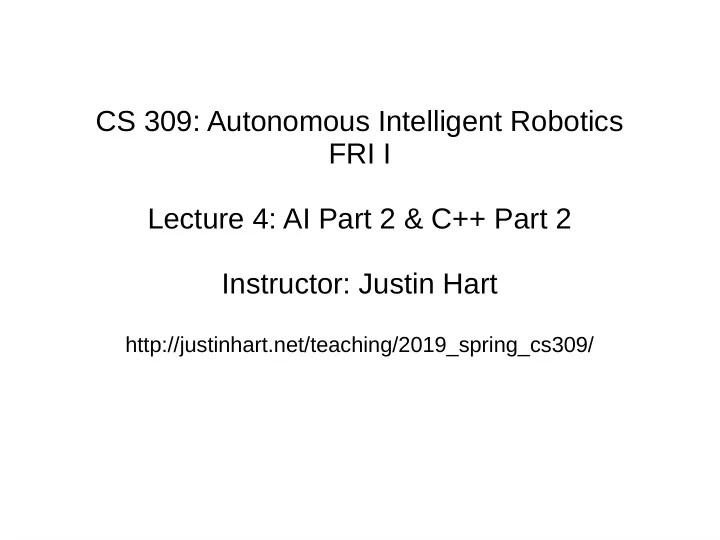

CS 309: Autonomous Intelligent Robotics FRI I Lecture 4: AI Part 2 & C++ Part 2 Instructor: Justin Hart http://justinhart.net/teaching/2019_spring_cs309/
Today ● What is Artificial Intelligence? – Part 2 ● C++ Primer – Part 2
Areas of Artificial Intelligence ● Planning & Scheduling – Related: ● Problem Solving ● Knowledge Representation and Reasoning ● Machine Learning – Classification – Regression – Clustering
Areas of Artificial Intelligence ● Natural Language Processing ● Computer Vision – And more broadly, perception ● Robotics
Planning & Scheduling ● Planning problems – An easy to picture planning problem is solving a maze
Planning & Scheduling ● Picture a robot in this maze – It runs a “search” algorithm ● Up: Doesn't work ● Left: Doesn't work ● Right: Works! ● Down: Doesn't work ● “Search” – Repeat until you've solved the maze. – Storing each position and trying each move until you find a path through, so you can go back if you get stuck.
Planning & Scheduling ● More complicated & more abstract – The “agent” can do a set of actions: ● Pick up block ● Put down block ● Stack block on another block ● Stack block on table
Planning & Scheduling ● Scheduling Problems – Classic: Job Shop Scheduling ● You have 'n' jobs and 'm' machines ● How do you find the fastest schedule to complete the job? – Another Example ● How do you make the most money on Superbowl ads?
Machine Learning ● Classification – Identifying a class that a datum fits into – Binary classification ● Two classes – Often, “it is or isn't something.” – Medical diagnosis ● Multi-class classification (n- ary) – Image classification ● It's a cat, or a dog, or a soda can
Machine Learning ● Multi-Class Example – YOLO ● You Only Look Once
Machine Learning ● Regression – Given these parameters, what is the value of <blank>? – I want my car to go at this speed – I want to know the predicted value of a stock ● Clustering – These data are similar in some way
Natural Language Processing ● Parsing – Syntactic ● The dog is in the yard. ● The/DT dog/NN is/VBZ in/IN the/DT yard/NN – Semantic ● in(yard,dog) ● Perceptual Grounding – Pairing percepts to semantics ● For instance, teaching a robot what a can looks like, or the color red, or the word “heavy”
Natural Language Processing ● Sentiment analysis – Does this newspaper article say something positive or negative? ● Text summarization – Take a newspaper article, make 1-10 lines to summarize ● Image captioning – Look at a picture, tell me what is in it
Computer Vision ● Image Recognition – Identify image contents – YOLO ● Stereo Reconstruction – Given 2 images, reconstruct 3D scene ● Segmentation – Pick apart the pieces of an image ● Edge Detection
Robotics ● Shakey the robot – Stanford Research Institute ● Now SRI international ● 1966 – Simple computer vision – Navigation in multiple rooms – Blocks – Planning in STRIPS ● Stanford Research Institute Planning System ● In the next few lectures, we will learn about STRIPS in detail
Robotics ● Waseda WABOT – First full-scale humanoid – 1967 ● Kuka Robots – 1970s – Used in automotive production
Robotics ● Genghis – 1989 – Inexpensive, tested gait patterns ● No Hands Across America – CMU NavLab – 1995!!
Robotics ● Cog – MIT – Late 90s, early 00's – An attempt to emulate human-like intelligence and human development
Robotics ● DARPA Grand Challenge – Autonomous vehicle race across Mojave Desert – Kicked off autonomous vehicles commercially
Robotics ● Androids – Geminoid – Erica https://www.youtube.com/watch? ● v=oRlwvLubFxg
Robotics ● A Rock Paper Scissors Robot https://www.youtube.com/watch?v=3nxjjztQKtY ●
Robotics ● Honda – ASIMO ● Toyota – Partner Robot – Human-Support Robot (HSR)
Robotics ● Building-Wide Intelligence
On to C++ ● We will talk a LOT about robots and AI in this class, but we need to move on to some C++ ● We will put off make/cmake this lecture to focus more on C++
Hello World! ● Hello World is kind of a traditional programming exercise to demonstrate the basics of a programming language. – C & C++ versions of this look similar, but different ● Exercise Objectives: – #include – main() – printf/std::cout – return – Basic syntax – Invoking the compiler
g++ ● GNU c++ compiler ● G++ <input> -o
Recommend
More recommend